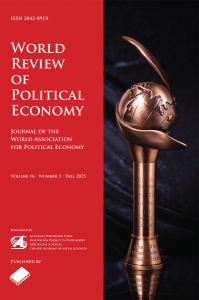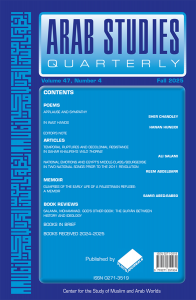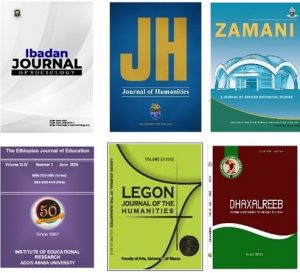Inequality, International Law & Decolonial Resistance
As Thanksgiving approaches, we’re serving up plenty of food for thought, with new articles from World Review of Political Economy and Arab Studies Quarterly, as well as the latest news from our African Journals Initiative.
All of our journals are Diamond Open Access and all articles are free to read. You can see our whole collection and the archive on ScienceOpen and JSTOR.
 The latest issue of World Review of Political Economy, Volume 16, Issue 3, opens with “A Theoretical Enquiry into Social and Spatial Inequalities: An Urban-Regional Political Economy Perspective” by Raju Das, which examines the uneven nature of both social and spatial economic development under capitalism.
The latest issue of World Review of Political Economy, Volume 16, Issue 3, opens with “A Theoretical Enquiry into Social and Spatial Inequalities: An Urban-Regional Political Economy Perspective” by Raju Das, which examines the uneven nature of both social and spatial economic development under capitalism.
Ozan Giray Şahin and Gökhan Güneysu challenge the belief that international law can effectively address global problems in “From Colonisation to Imperialism: Internationalisation of Legal Form towards International Law“. The article calls for a critical reassessment of international law’s role, emphasising its function in maintaining global hierarchies and its failure to confront the root causes of underdevelopment in the global capitalist system.
In “Property Rights in Light of the Economic Sanctions Imposed on Russia by Europe and the United States“, Bin Yu critiques Western sanctions on Russia, arguing they deviate from traditional legal and political-economic definitions of property rights. David Laibman proposes a renewed approach to Marxist value theory that bridges the divide between orthodoxy and scepticism in “The Value Theory Puzzle: Will Asking the Right Questions Lead to New Results?“.
Finally, in “Inflation and the Marxist Theory of Reproduction” Stavros Mavroudeas and Athanasios Chatzirafailidis argue that inflation is fundamentally a production-based phenomenon, grounded in real economic processes rather than purely monetary factors.
 Arab Studies Quarterly, Volume 47, Issue 4, begins with Ali Salami’s article “Temporal Ruptures and Decolonial Resistance in Sahar Khalifeh’s Wild Thorns” which depicts West Bank resistance to Israeli occupation that suppresses Palestinian life and liberty. The article utilises a few concepts to show how the novel’s narrative techniques “generate temporal disjunctions and counteract the colonization of Palestinian time.” Sahar Khalifeh’s techniques show how Palestinian agency and resistance counter the occupation’s attempts “to regulate Palestinian temporality.”
Arab Studies Quarterly, Volume 47, Issue 4, begins with Ali Salami’s article “Temporal Ruptures and Decolonial Resistance in Sahar Khalifeh’s Wild Thorns” which depicts West Bank resistance to Israeli occupation that suppresses Palestinian life and liberty. The article utilises a few concepts to show how the novel’s narrative techniques “generate temporal disjunctions and counteract the colonization of Palestinian time.” Sahar Khalifeh’s techniques show how Palestinian agency and resistance counter the occupation’s attempts “to regulate Palestinian temporality.”
Reem Abdel Barr’s article “National Emotions and Egypt’s Middle-Class/Bourgeoisie in Two National Songs Prior to the 2011 Revolution” analyses two national songs through the concept of “emotions” to argue how the concept is critical to creating a “middle class/bourgeois image of Egypt.” Interrogating the relationship between emotions, culture, and national songs prior to a “revolutionary moment” that challenges “bourgeois values,” the article emphasises “emotions” as a “site of the political.”
Samir Abed-Rabbo’s memoir “Glimpses of the Early Life of a Palestinian Refugee: A Memoir” describes the early life of the author as a refugee in the context of the changing political situation of the period. The author’s description of his life depicts the lives of millions of Palestinian refugees and how political events had impacted them.
 The African Journals Initiative (AJI) first six titles are Diamond Open Access, with all articles free to read. Issues are available as they are published on ScienceOpen and JSTOR.
The African Journals Initiative (AJI) first six titles are Diamond Open Access, with all articles free to read. Issues are available as they are published on ScienceOpen and JSTOR.
● Dhaxalreeb, Somaliland
● The Ethiopian Journal of Education, Ethiopia
● Ibadan Sociology Journal, Nigeria
● Journal of Humanities, Malawi
● Legon Journal of the Humanities, Ghana
● Zamani: A Journal of African Historical Studies, Tanzania
We are currently considering titles for 2026 and have an exciting selection of journals from across Africa. We look forward to sharing them with you!
If you would like to hear about the latest articles from the African Journals Initiative, you can sign up to the newsletter here. The latest newsletter focussed on Zamani, the journal of African Historical studies based in Tanzania. Zamani promotes African perspectives and thinking on African history. It has an international editorial board and welcomes cutting-edge and high-quality research on Africa’s rich and diverse pasts.
Stay up-to-date with the latest research highlights by signing up to the Pluto Journals newsletter!

